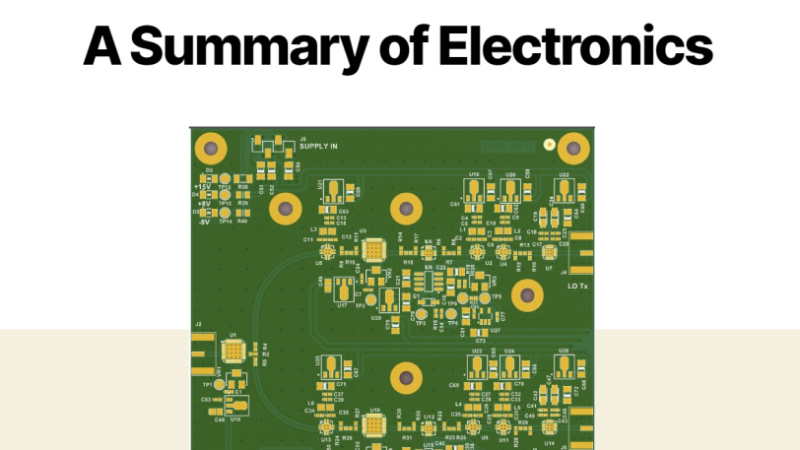Many of us don’t have a formal background to build off when taking on new hacks, we have had to teach ourselves complex concepts and learn by doing (or more commonly, by failing). To help new hackers get off the ground a bit easier, [PhilosopherFar3847] created a fantastic starter’s resource on electronics, The Electroagenda Summary of Electronics.
[PhilosipherFar3847] created Electroagenda with the goal of helping amateurs, students, and professionals alike better understand electronics. The Summary of Electronics, one of the more recent additions to the website, is split across 26 sections each breaking down a different electrical concept into easy-to-understand facts with no math or unfamiliar jargon. The summary covers a broad range of electronics, from simple passive components and their uses, up to the basic operating concepts of a microcontroller.
While this resource on its own will not be enough to get a fledgling hacker started making cool circuits, it does provide a very important skill; knowing how to ask the right questions. This base of knowledge provides enough context and keywords to better articulate a challenge and Google-fu a bit more effectively.
Are you the aforementioned fledgling hacker, looking to learn more? check out these nifty logic gates you can plug into each other to build a basic circuit.
[via r/diyelectronics]
















A weird mix of academic knowledge and O’Reilly-like dumbing-down. Sorry, but in its current state it has little use.
Take into account I originally wrote this text for people that know nothing about electronics. Just to explain in plain text “difficult” concepts. The text makes sense for them, for some potential students, for amateurs or even for engineers that have forgotten basic concepts.
If you mean the text has little use for electronics experts or professionals (like myself), I agree with you.
In any case, thanks for the feedback.
Fantastic. Kudos to the author
Thanks for the feedback.
Another similar initiative (which may have been already featured on Hackaday, I’m not sure, but it’s worth repeating it anyway) is a book called Designing Electronics that Work : http://designingelectronics.com/. The ebook is free, I’m halfway through it and it gives a lot of useful tips if you are not already an EE guru. It could be a nice follow-up after the website mentioned in the article.
I wonder whether an offline (PDF/EPUB) version would be available. Maybe a parser could output a clean copy (and not merely PDF “prints” of HTML pages)?
I would appreciate if you just distribute the link instead. As you can see the web does not have ads, but I intend to add them in the future. I won´t get rich, but maybe it will pay the server….
I am a member of a group of engineers that has been teaching an embedded electronics course to people aged 12 to 17 for last 20 years. I forwarded the link to two of them less than two hours ago and just received a ‘thumbs down’ from both.
I cannot not speak for those that are self-taught (which has extreme limitations for math, physics, chemistry, and electrical engineering), but my experience with young people (whom are eager to learn), does not support the OP’s marginal content and that the poor presentation method could lead to misunderstandings and unsuccessful learning results.
And before anyone ask, neither do I recommend the oft idolized Art of Electronics, nor the Student Manual For the Art of Electronics, nor Learning the Art of Electronics: A Hands-On Lab Course for self-taught course-ware. I have not looked at this series for several years, but the last view our group gave to these books revealed too many typos, circuit errors, code errors, poor design practices, and some analogies that were in poor taste – and this all from a respected university professor.
The linked attempt at electronic education suffers similar problems.
So what are those going the self-taught route left with? Unless the student is a freaking genius (in which case she would not need the watered down and useless math and physics), there seem to be no universal solutions for competent self-taught course-ware where applied physics is the subject. But the on-line course-ware from UC, MIT, CMU, etc are very close and have the advantage of learning with a (virtual) group and having access to a real human instructor.
I once ran across a page setup for self paced learning of basic electronics and Arduino(?) with something called “Concept Cards”. I’d thought I’d bookmarked it but can no longer find it. I have a half dozen 5th graders who have had little to no circuit experience but want to learn robotics and I was thinking of supplying them with kits and a bunch of concept cards to start off. Things like what a circuit is, what a resistor is, a diode, LED, switch, battery just to get them started. Then move on to voltage measurements, switching things on/off to explain PWM and then move onto Scratch or Blockly to get them programming those same things instead of them pushing a switch to turn things on/off followed by controlling a servo. With any luck I’ll get to DC motors, going forward and backwards then explain the H-bridge and show them controlling that in Scratch/Blockly.
Brian, have you run across Concept Cards or even better any already done for these basic concepts?
What I liked about the Concept Cards I’d seen was they had 2-3 levels(colors) so you could do the green cards in order and get the task done but the yellow cards provided more detailed information and blue cards introduced even more details like Ohms law, parallel/series resistors, batteries, etc.
Just a shame they’ve not had any electronics yet so hoping it’ll lead them to a robotics club in middle school so they’ll be ready to go when they hit high school.
Do not know of any. And would probably not use such a vehicle as ‘concept cards’. The accreditation auditors said that they did not consider our course suitable for public schools (our group teaches at two private parochial schools) but did say the course material and lesson plans should be used by some of the special magnet and charter schools that are now proliferating around the state, which is a moot point because the school board will not allow us to submit our lesson plans or course material to the state. And the course is certainly ill-suited for 10 and 11 year old children. Our course-ware is designed to be applied physics and logical analysis ‘apparently’ taught as basic electrical and mechanical engineering.
I believe that my side-gig in teaching is significantly less onerous than your efforts to teach electrical theory to a 10 year-old. Good luck.
Ok, thanks. Just wanting to keep it to the basics so connecting wires to a battery and an LED doesn’t seem so much like magic and see what sticks. Showing Ohm’s Law might even provide insights into the reality of how useful the math they are learning can be.
An add-on to this summary: A simple electronics distortion overview:
https://electroagenda.com/en/transmission-media/